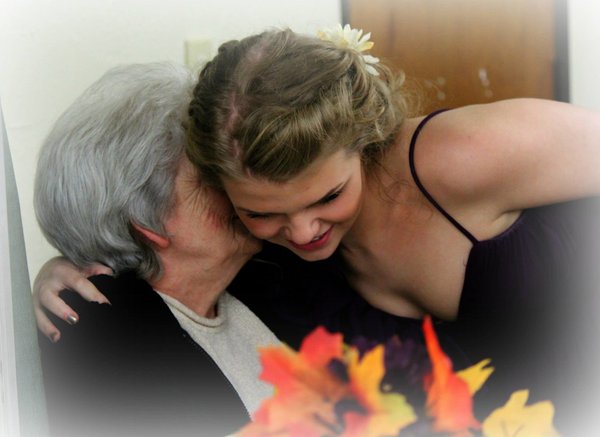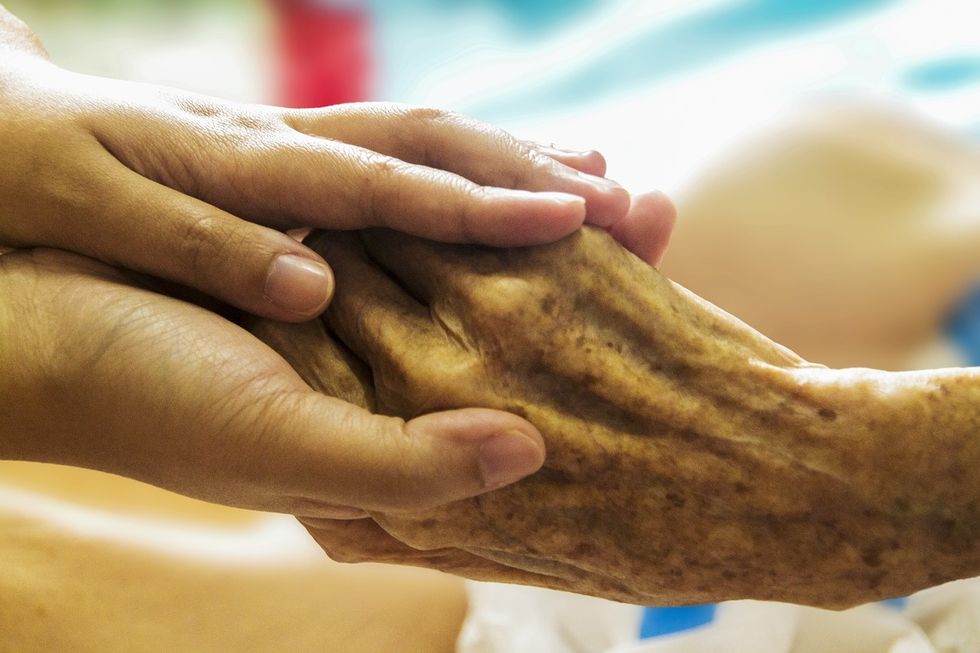Death is a difficult subject.
It is addressed differently across cultures, lifestyles, and religions, and it can be difficult to find the right words to say when in the company of someone who is dying. I have spent a lot of time working with hospice patients, and I bore witness to the varying degrees of memory loss and cognitive decline that accompany aging and disease.
The patients I worked with had diverse stories and interests, and although we might have had some trouble understanding each other, we found ways to communicate that transcended any typical conversation.
I especially learned a lot from patients severely affected by dementia.
They spoke in riddles, but their emotions were clearly communicated through their facial expressions and general demeanor, which told a story all on their own.
We would connect through smiles and short phrases, yes or no questions, but more often than not, their minds were in another place. Some patients would repeat the details of the same event, over and over, with varying levels of detail each time.
Others would revert to a child-like state, wondering about their parents, about school, and about family and friends they hadn't seen in a long time.
I often wondered why their minds chose to wander to a certain event or time period and leave them stranded there before the end of their life. Was an emotionally salient event reinforcing itself in their memories?
Was their subconscious trying to reconnect with people from their past? All I could do was agree and follow their lead because the last thing I wanted to do was break their pleasant memory.
I felt honored to be able to spend time with them, but I couldn't shake the feeling that I was intruding on their final moments, moments that might be better spent with family and loved ones. I didn't know them in their life, so I wondered how they benefited from my presence in their death.
However, after learning that several of the patients I visited didn't have anyone to come to see them, I began to cherish every moment spent, whether it was in laughter or in tears. Several of the patients never remembered me. Each week, I was a new person, and each week they had a different variation of the same story that they needed to tell me.
In a way, it might have made it easier to start fresh every week rather than to grow attached to a person they would soon leave.
Usually, the stories were lighthearted.
They were reliving a memory or experiencing life again as if it were the first time, but as the end draws nearer, a drastic shift in mood and demeanor is evident.
A patient who was once friendly and jolly can quickly become quiet, reflective, and despondent. I've seen patients break down and cry, not because of their current situation, but because they were mourning old ones. These times taught me a lot about how to be just what that person needs towards the end of their life.
I didn't need to understand why they were upset or what they wanted to say.
The somber tone and tired eyes let me know that what they had to say was important and worth hearing. What mattered most is that someone who cared was there to hear it.





 women in street dancing
Photo by
women in street dancing
Photo by  man and woman standing in front of louver door
Photo by
man and woman standing in front of louver door
Photo by  man in black t-shirt holding coca cola bottle
Photo by
man in black t-shirt holding coca cola bottle
Photo by  red and white coca cola signage
Photo by
red and white coca cola signage
Photo by  man holding luggage photo
Photo by
man holding luggage photo
Photo by  topless boy in blue denim jeans riding red bicycle during daytime
Photo by
topless boy in blue denim jeans riding red bicycle during daytime
Photo by  trust spelled with wooden letter blocks on a table
Photo by
trust spelled with wooden letter blocks on a table
Photo by  Everyone is Welcome signage
Photo by
Everyone is Welcome signage
Photo by  man with cap and background with red and pink wall l
Photo by
man with cap and background with red and pink wall l
Photo by  difficult roads lead to beautiful destinations desk decor
Photo by
difficult roads lead to beautiful destinations desk decor
Photo by  photography of woman pointing her finger near an man
Photo by
photography of woman pointing her finger near an man
Photo by  closeup photography of woman smiling
Photo by
closeup photography of woman smiling
Photo by  a man doing a trick on a skateboard
Photo by
a man doing a trick on a skateboard
Photo by  two men
two men  running man on bridge
Photo by
running man on bridge
Photo by  orange white and black bag
Photo by
orange white and black bag
Photo by  girl sitting on gray rocks
Photo by
girl sitting on gray rocks
Photo by  assorted-color painted wall with painting materials
Photo by
assorted-color painted wall with painting materials
Photo by  three women sitting on brown wooden bench
Photo by
three women sitting on brown wooden bench
Photo by 
 Photo by
Photo by  Photo by
Photo by  Photo by
Photo by  Photo by
Photo by 


 people sitting on chair in front of computer
people sitting on chair in front of computer



 all stars lol GIF by Lifetime
all stars lol GIF by Lifetime two women talking while looking at laptop computerPhoto by
two women talking while looking at laptop computerPhoto by  shallow focus photography of two boys doing wacky facesPhoto by
shallow focus photography of two boys doing wacky facesPhoto by  happy birthday balloons with happy birthday textPhoto by
happy birthday balloons with happy birthday textPhoto by  itty-bitty living space." | The Genie shows Aladdin how… | Flickr
itty-bitty living space." | The Genie shows Aladdin how… | Flickr shallow focus photography of dog and catPhoto by
shallow focus photography of dog and catPhoto by  yellow Volkswagen van on roadPhoto by
yellow Volkswagen van on roadPhoto by  orange i have a crush on you neon light signagePhoto by
orange i have a crush on you neon light signagePhoto by  5 Tattoos Artist That Will Make You Want A Tattoo
5 Tattoos Artist That Will Make You Want A Tattoo woman biting pencil while sitting on chair in front of computer during daytimePhoto by
woman biting pencil while sitting on chair in front of computer during daytimePhoto by  a scrabbled wooden block spelling the word prizePhoto by
a scrabbled wooden block spelling the word prizePhoto by 
 StableDiffusion
StableDiffusion
 StableDiffusion
StableDiffusion
 StableDiffusion
StableDiffusion









